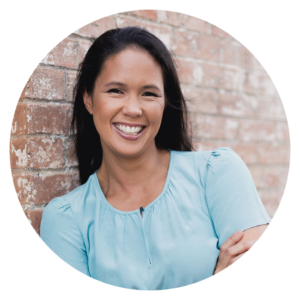No body wants to do anything they HAVE to do.
Do you think you HAVE to get control of your weight or your diabetes? That you HAVE to take medications or check your blood sugars?
When you have to do something, you end up forcing yourself, pushing yourself toward it. You resist it. You argue with yourself about doing it.
This never works for long. Why? Because it doesn’t feel good, and humans avoid negative emotion.
Everything we do or don’t do is because of a feeling. It’s how we think we will feel when we do or don’t do the thing that drives our decision to do it or not do it. This is very important to know when we are trying to change our behavior, right?
If you HAVE to do something, what are you feeling? Dread? Obligation? Guilt? Shame? If these are the feelings that are fueling your decisions and your actions, it’s no wonder you avoid it.
You might think, “Well, what am I supposed to do? Look at all this stuff I have to do all the time! Life isn’t just a nonstop party.” 🙄 🤷♀️
😆 You are right, it’s not a nonstop party.
But there is a way to stop dragging yourself around doing the things you think you have to do and don’t want to do.
First, challenge the idea that you have to do anything. ☝ Really question that.
I used to tell myself I had to do “all this stuff:” thousands of tasks in order to keep my 5 small children alive and healthy. You know – all the thankless slaving involved with that job. It was a miserable existence, believing that story. Not only did I resent my family, I pitied myself and created enormous unnecessary suffering with how I was choosing to look at my life.
Then I realized: I don’t have to do any of this. I can get in my car and actually drive away. No one could stop me. It’s 100% available to me. 🤯
This was a major turning point in my life.
Of course, I didn’t plan to abandon my family. But the moment I really accepted that fact, really took full responsibility for being here and doing everything I was doing, I was able to stop telling myself I had to do it.
I was doing it because I wanted to do it! I wanted to change the diapers, clean up the food on the floor, and get up in the middle of the night. Once I acknowledged that, I stopped feeling so much self-pity and resentment.
All it takes is a switch in your mindset. Simple and so powerful.
Who says you have to get control of your diabetes or take medication? You get to choose. No one can make you do anything.
Second, do only what you want to do.
How do you get yourself to want to change? This can seem impossible.
I will tell you: Desire to change will take root and grow to have a life of its own if you can learn to accept and love yourself as you are.
I am being serious.
This is not some foolish or idealistic philosophy that has no useful application. If you can open your mind to the possibility of creating this in your life, I promise, it will yield nothing short of magic.
Think about this: is there someone in your life that you want to change? Maybe your spouse or a coworker. Maybe it’s your child or your mother-in-law. Most of have someone in our lives that we have tried to control or change.
We’ve tried many tactics: manipulating, threatening, withholding love, reasoning, ingratiating, bargaining, guilting, on and on and on. Does it work? Almost never. If someone doesn’t want to change, it ain’t happenin’.
What’s really fascinating is that when we stop trying to change someone, and just let them be themselves (how nice of us, right?), they stop resisting us. They stop being obstinate in their “flawed” way of being. When we just love someone even when we don’t think they deserve it, oftentimes, they decide to change of their own accord.
Why is that? It’s because the most powerful psychological motivator we have is love. It’s not fear or intimidation, as you might guess. There is no defense against love.
“Love is the only force capable of transforming an enemy into a friend.” – Martin Luther King, Jr.
Can we apply this same concept to ourselves? Yes, indeed.
Think of someone you love unconditionally. Your child, perhaps. When they were small and helpless, especially. Think of how you make decisions about their well-being and their future. You want to do your best by them. You wouldn’t jeopardize their safety for convenience or your own pleasure. You say, “No” when there’s risk or harm at stake.
Imagine what it would be like to make decisions for yourself in this same way. From a place of unconditional love. From 100% acceptance.
You stop resisting what you know is best for yourself. You take care of yourself. You don’t blame and judge yourself. You forgive yourself when you make a mistake. You encourage yourself to keep trying until you succeed.
I was talking to someone recently who wanted to share their struggles with their diabetes with me. He said several times in our conversation that he “doesn’t have anyone in his corner,” as if he was at a disadvantage. As an explanation for why he couldn’t make healthy decisions for himself.
What if you could love yourself enough that you didn’t need anyone else’s acceptance or support?
If you could figure this out, you would become unstoppable. Not just with your health, but with any goal you set for yourself.
I am reading a transformative book right now: Love Yourself Like Your Life Depends On It written by Kamal Ravikant. He offers that anytime you are facing a decision, ask yourself, “If I loved myself truly and deeply, what would I do?”
If he finds himself about to repeat an old destructive habit, he takes a deep breath and asks, “If I loved myself…with all my heart, wanting only the very best for myself…,would I do this?”
Loving yourself takes commitment and intentional practice. Sometimes, we have to start with just liking ourselves, or even just some parts of ourselves. We have to see the beliefs we have about ourselves that create feelings of worthlessness or self-loathing. These beliefs can be challenged, overcome, and replaced with acceptance and even love.
But it’s hard to do on your own because we don’t always see our thoughts as optional. This is why a coach is so valuable. We listen to you and show you where you are getting in your own way. We teach you how to create new patterns of thinking that drive relentless action toward your goals.
Want to know more? I’m putting on a free online class just for you. I’m teaching my most helpful tools so that you can apply them and turn your struggles with diabetes around right away. 🙌
Sign up here: 👇
https://www.afuturebydesign.com/free-webinar


